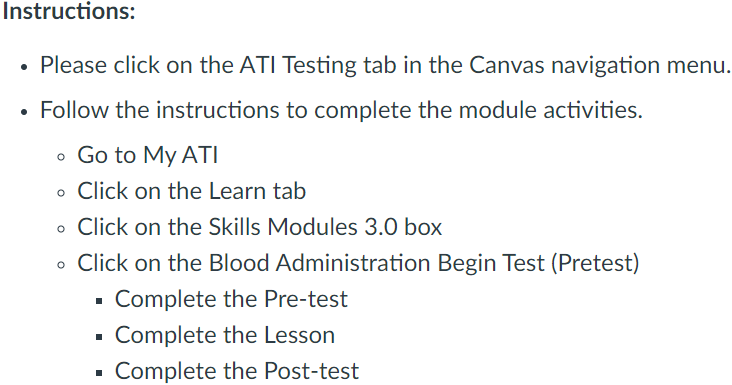NUR105 M4.5: ATI Skills Modules: Blood Administration (45 Minutes)
Question: A nurse is caring for a client who is about to receive a unit of packed RBCs and states, “This is my third unit of blood today. I don’t want to get some disease from all this blood.” Which of the following responses should the nurse make?NUR105 M4.5: ATI Skills Modules
Answer: B. “Donated blood is carefully screened for infectious diseases.”
Explanation: The nurse should reassure the client that donated blood undergoes rigorous screening for infectious diseases, making it safe for transfusion.
Question: A nurse is providing education to a client who has a prescription for a blood transfusion. Which of the following statements should the nurse include in the teaching?
Answer: D. “You must immediately report any symptoms like chills, nausea, or itching.”
Explanation: Clients must be informed that they should report any adverse symptoms or sensations during the transfusion, as the nurse may not be able to identify subjective symptoms.
Question: A nurse started a transfusion of packed RBCs for a client 1 hr ago. The client has suddenly developed shaking chills, muscle stiffness, and a temperature of 38.6°C (101.5°F). The client appears flushed and reports a headache and “nervousness.” The nurse should identify that the client has most likely developed which of the following types of transfusion reaction?NUR105 M4.5: ATI Skills Modules
Answer: D. Febrile nonhemolytic
Explanation: The client’s symptoms, including fever, chills, and headache, are characteristic of a febrile nonhemolytic transfusion reaction, which is the most common type of transfusion reaction.
Question: A nurse is preparing a blood transfusion for a client who has type A blood. The nurse should know that the client can safely receive blood from blood group O because:
Answer: A. Type O blood contains no A antigens.NUR105 M4.5: ATI Skills Modules
Explanation: Type O blood contains no A antigens, making it compatible with clients who have type A blood.
Question: Which of the following actions should a nurse take prior to starting a blood transfusion?
Answer: C. Ensure that informed consent has been obtained from the client.
Explanation: It is essential to ensure that the client has given informed consent before initiating a blood transfusion. Informed consent is the responsibility of the prescribing healthcare provider, and the nurse can witness the client’s signature.
Question: A nurse is caring for a client who is receiving a blood transfusion and reports itching. The nurse observes areas of urticaria on the client’s skin. Which of the following actions should the nurse take?NUR105 M4.5: ATI Skills Modules
Answer: B. Stop the blood transfusion.
Explanation: Itching and urticaria are signs of an allergic reaction to the blood transfusion. The nurse should stop the transfusion and follow facility protocol for transfusion reactions.NUR105 M4.5: ATI Skills Modules
Question: A platelet transfusion is indicated for a patient who:
Answer: B. Has thrombocytopenia.
Explanation: A platelet transfusion is typically indicated for a client with thrombocytopenia (low platelet count).
Question: A client who is anticipating a total hip replacement is considering autologous transfusion. When teaching this client about autologous transfusion, it is important to emphasize that:
Answer: A. It reduces the risk of mismatched blood.
Explanation: Autologous transfusion involves using the client’s own blood, reducing the risk of receiving mismatched blood.
Question: When administering a transfusion of packed red blood cells, it is important to:
Answer: B. Make sure the entire unit is transfused within 4 hr.
Explanation: To prevent bacterial proliferation, a unit of packed RBCs should be transfused within 4 hours.
If you are preparing for ATI testing or the NCLEX exam and need expert guidance, consider our services at fixmygpa.com. We offer comprehensive tutoring and support to help you excel in your nursing education and succeed in these crucial exams. Our team is dedicated to helping you achieve your academic and professional goals in the field of nursing. Don’t hesitate to reach out for the assistance you need to secure your success!



